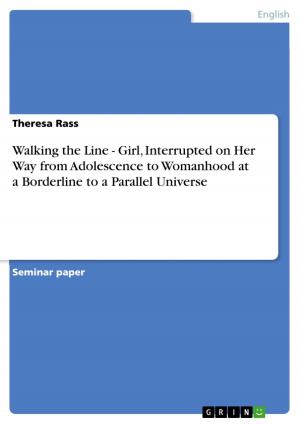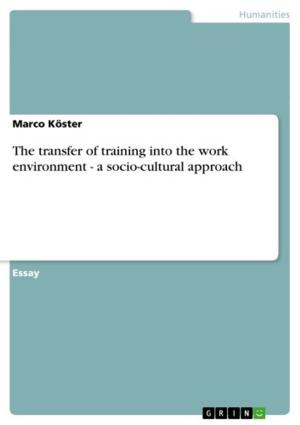Distance-Learning Strategies in Campus-Based Translator Education
Nonfiction, Entertainment, Drama, Anthologies| Author: | Rene Hoffmann | ISBN: | 9783638162418 |
| Publisher: | GRIN Publishing | Publication: | January 9, 2003 |
| Imprint: | GRIN Publishing | Language: | English |
| Author: | Rene Hoffmann |
| ISBN: | 9783638162418 |
| Publisher: | GRIN Publishing |
| Publication: | January 9, 2003 |
| Imprint: | GRIN Publishing |
| Language: | English |
Diploma Thesis from the year 2001 in the subject American Studies - Miscellaneous, grade: 1,0 (A), Johannes Gutenberg University Mainz (Applied Language and Literature Studies), 69 entries in the bibliography, language: English, abstract: The profession of translation operates on the cutting edge of globalization. Both practicing professionals and researchers testify to an increasing use of computer tools in general, and information and communication technologies in particular, by translators when they conduct their work. Translators and their clients, as well as their colleagues, are frequently located in different parts of the world and rely on electronic tools to exchange information between one another. University-level translator education is attempting to keep up with these developments, but in light of the financial constraints, it cannot help but fall behind in its effort to realistically emulate the translator's profession and to prepare students for their lives as professional translators. There is clearly a need for effective computer use in the translator education classroom to ensure that the students' transition between graduation and entry into the workforce will not become even more difficult than it already is. Practitioners in distance education have long been forced to devise new economically and educationally efficient strategies to prepare students for their later professions. These strategies possess the potential to aid translator education in its struggle of incorporating computers as an integral part of the educational process. This thesis commences by defining distance education and by introducing different forms thereof. Various examples are discussed, as well as positive and negative attitudes towards distance education and the main differences to campus-based education. Based on these findings, the relevance for translator education (Chapters 1 and 2) is presented. After introducing the basic theory of a constructivist approach to learning (Chapter 3) and discussing pertinent skills of professional translators (Chapter 4), Chapter 5 proposes specific distance-learning environments for three different types of classes in university-level translator education, as well as additional benefits of employing distance learning environments. Finally, Chapter 6 briefly reviews the major points of this thesis and draws the germane conclusion. This thesis is mainly geared toward the academic community in translator education in an effort to bring this matter to the forefront of discussion. [...]
Diploma Thesis from the year 2001 in the subject American Studies - Miscellaneous, grade: 1,0 (A), Johannes Gutenberg University Mainz (Applied Language and Literature Studies), 69 entries in the bibliography, language: English, abstract: The profession of translation operates on the cutting edge of globalization. Both practicing professionals and researchers testify to an increasing use of computer tools in general, and information and communication technologies in particular, by translators when they conduct their work. Translators and their clients, as well as their colleagues, are frequently located in different parts of the world and rely on electronic tools to exchange information between one another. University-level translator education is attempting to keep up with these developments, but in light of the financial constraints, it cannot help but fall behind in its effort to realistically emulate the translator's profession and to prepare students for their lives as professional translators. There is clearly a need for effective computer use in the translator education classroom to ensure that the students' transition between graduation and entry into the workforce will not become even more difficult than it already is. Practitioners in distance education have long been forced to devise new economically and educationally efficient strategies to prepare students for their later professions. These strategies possess the potential to aid translator education in its struggle of incorporating computers as an integral part of the educational process. This thesis commences by defining distance education and by introducing different forms thereof. Various examples are discussed, as well as positive and negative attitudes towards distance education and the main differences to campus-based education. Based on these findings, the relevance for translator education (Chapters 1 and 2) is presented. After introducing the basic theory of a constructivist approach to learning (Chapter 3) and discussing pertinent skills of professional translators (Chapter 4), Chapter 5 proposes specific distance-learning environments for three different types of classes in university-level translator education, as well as additional benefits of employing distance learning environments. Finally, Chapter 6 briefly reviews the major points of this thesis and draws the germane conclusion. This thesis is mainly geared toward the academic community in translator education in an effort to bring this matter to the forefront of discussion. [...]















